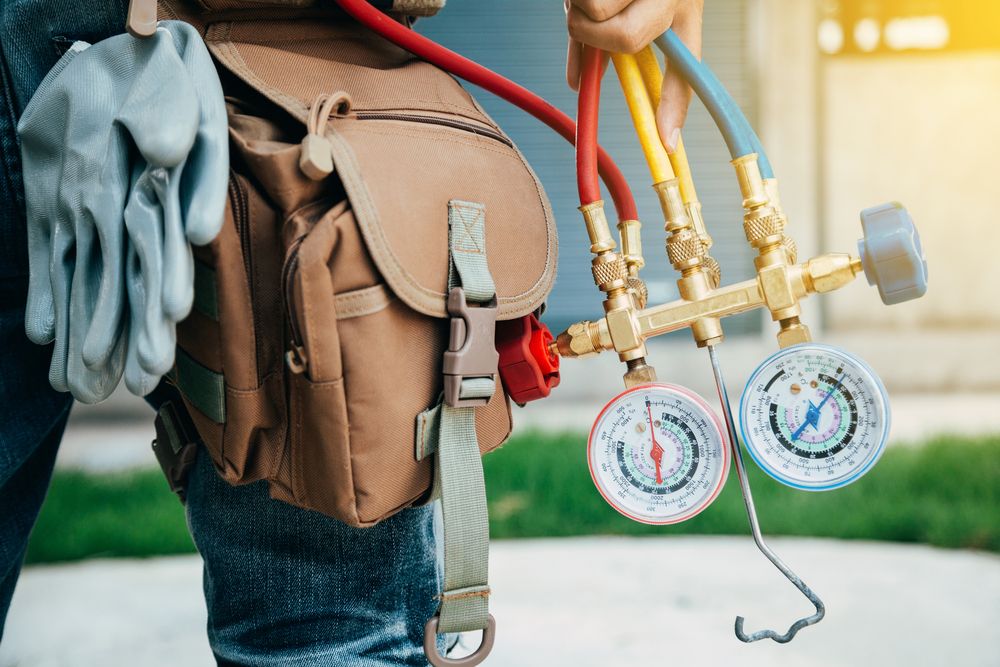Keep Your Home Comfortable Year-Round with DMAKS HVAC Support.
Keep Your Home Comfortable Year-Round with DMAKS HVAC Support.
Blog Article
Exactly How to Select the Right Heating And Cooling System for Your Needs
Selecting the appropriate cooling and heating system is a critical choice that needs cautious consideration of numerous variables. Begin by examining your home's size, layout, and one-of-a-kind needs, as these aspects dictate the essential ability and setup of the system. Additionally, developing a budget plan that encompasses installment and long-lasting operational prices is necessary. As you weigh your alternatives, comprehending energy performance scores and the implications of your neighborhood climate will certainly play a considerable role in your option. However, the myriad of system kinds offered can complicate this procedure, leading one to question which course eventually leads to ideal comfort and effectiveness.
Examine Your Home Dimension
Evaluating your home size is an important very first action in choosing the proper Cooling and heating system. A HVAC system that is too tiny will certainly battle to keep comfy temperature levels, leading to raised power usage and wear on the system.
To precisely evaluate your home size, measure the square video of each area, taking into consideration factors such as ceiling height and the format. In addition, take into consideration the insulation high quality and the number of windows, as these elements influence thermal efficiency. Houses with open floor strategies might need different system arrangements contrasted to those with lots of divided spaces.
Making Use Of the Handbook J tons calculation approach can supply a much more precise price quote of your cooling and heating needs. This method make up different elements, consisting of regional climate, solar gain, and tenancy patterns. By thoroughly assessing these aspects, you can make certain that your picked heating and cooling system is appropriately sized, bring about improved comfort, power efficiency, and long life of the devices.
Determine Your Budget
Establishing your budget plan is a pivotal action in the heating and cooling system option process, as it establishes the parameters for your alternatives - DMAKS HVAC. An a/c system is a significant financial investment, and recognizing your economic limits will help limit options that fit within your methods
Begin by examining not just the preliminary acquisition price however additionally installation expenses, which can differ substantially relying on the complexity of the job. Furthermore, take into consideration ongoing costs such as upkeep, repairs, and energy usage. A system might show up cost effective originally but can result in greater prices with time if it is less efficient.
It is recommended to designate a backup fund for unanticipated expenditures that may arise during installation or preliminary system modifications (DMAKS HVAC). Furthermore, discover funding alternatives or discounts that might be readily available, as these can ease the burden of upfront costs
Inevitably, having a clear budget plan allows you to involve with a/c experts more properly, guaranteeing you receive customized guidance that aligns with your monetary goals and home demands. By being thorough about your spending plan, you can make educated choices that improve comfort without endangering monetary stability.
Evaluate Power Efficiency
Power efficiency plays an essential role in the total performance and cost-effectiveness of your cooling and heating system. When choosing a system, it is essential to consider its power efficiency scores, as these numbers directly influence your utility expenses and ecological footprint. Try to find systems with a high Seasonal Power Efficiency Ratio (SEER) for cooling down and a high Annual Gas Utilization Performance (AFUE) rating for heating. Greater ratings suggest better efficiency, indicating more comfort for much less power consumption.
In addition, consider the Energy Celebrity qualification, which signifies that the system meets strict effectiveness standards established by the Environmental Protection Agency. Buying an Energy Star-rated heating and cooling system can cause substantial financial savings with time, particularly in areas with extreme temperature fluctuations.
Another factor to evaluate is the system's size and capacity. An oversized or small device can bring about inadequacy and raised power prices. DMAKS HVAC. Correct sizing, usually established via a Hand-operated J lots computation, makes sure that the system operates at optimal efficiency


Take Into Consideration Climate and Environment
When choosing a cooling and heating system, it is crucial to consider the regional climate and ecological problems, as these variables dramatically influence the system's performance and efficiency. Different regions experience varying temperature extremes, humidity levels, and seasonal changes, all of which impact home heating and cooling down needs.

Additionally, local environmental factors, such as air high quality and possible allergens, need to inform your selection. Systems furnished with advanced filtering modern technologies can assist minimize pollutants and supply cleaner air. In addition, think about the power resources available in your location-- some HVAC systems are much more reliable read more when powered by gas or sustainable power resources.
Ultimately, aligning your a/c system selection with your neighborhood climate and environmental considerations will certainly result in enhanced convenience, improved performance, and reduced energy expenses.
Explore System Kind and Attributes
As property owners look for to maximize convenience and performance, exploring the various types of a/c systems and their one-of-a-kind features becomes vital. The key kinds of cooling and heating systems consist of main air conditioning, heat pumps, ductless mini-split systems, and furnaces. Each system provides distinct advantages tailored to different needs and preferences.
Central air conditioning systems offer uniform cooling throughout a home, making them perfect for larger spaces. Heatpump function as both home heating and cooling down remedies, making use of power to move warmth, which can lead to lower energy costs. Ductless mini-split systems are becoming increasingly preferred as a result of their versatility and simplicity of setup, allowing homeowners to control the temperature level in private spaces without comprehensive ductwork.

Final Thought
Finally, selecting the proper HVAC check out here system requires cautious factor to consider of numerous factors, including home size, budget plan restraints, power performance, local climate, and readily available system types. A comprehensive evaluation of these aspects makes sure optimum convenience and cost-effectiveness. By adhering to an organized strategy, homeowners can make informed decisions that align with their specific needs and preferences, ultimately resulting in improved indoor air high quality and energy savings.
Report this page